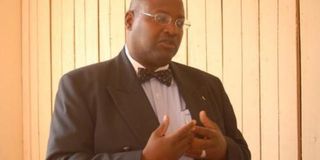Prime
Tanzanians testify to benefits of Chinese investment cooperation

TCFPA secretary general Joseph Kahama
Tanzanian and Chinese investors came together in Dar es Salaam earlier this week to share ideas and partner in investments.
The conference included investors from Zhejiang (Jinhua) province in China, who also visited the Sinotan industrial park at Kibaha district in Pwani region before returning to meet Tanzanian counterparts in Dar es Salaam.
Prime Minister Kassim Majaliwa, who graced the conference, said that China is the leading investor in Tanzania, with over $10 billion invested since 1997.
He added that a total of 1,134 projects have been registered with the Tanzania Investment Center (TIC), which are potential in creating employment opportunities for Tanzanians.
Several Tanzanian investors testified to the benefits of Chinese investment cooperation after the conference.
Managing director of Baba Watoto, a non-governmental organisation dealing with martial arts, Mgunga Mwa Mnyemelwa, said that they had already found an investment partner from China to work with.
"We participated in this conference to seek a partner to work with in martial arts, and now we have found fashion tourism investment from China, which we are in the process of signing a contract with," he said.
Joseph Kahama, general secretary of the Tanzania and China Friendship Promotion Association, said that they have played a role in connecting investors from China with Tanzanians.
"We would like to see Tanzanians and Chinese joined together in terms of cultural, economic as well as commercial. When a person mingles with others something will be developed," he said.
Augustine Masonga, managing director for Interbest Investment Co. Ltd., also testified to the benefits of the conference, saying that they had increased partners in their business.
"Our company imports electrical appliances which are normally used for electrical installation by the Rural Electrification Authority (REA) and Tanesco from China. So when we get investors from China, we use to exchange ideas on how to increase business in different ways," he said.
Dr. Celia Muyinga, a lecturer in geography, tourism, and hospitality services at the Open University of Tanzania, said that it was a great pleasure for her to meet some investors who were also interested in tourism.
Dr. Muyinga, who got her PhD from China, recommended having a database of Tanzanians who know the Chinese language so that they could help tourists from the country explore tourist attractions.
"I recommend that we would have a database of Tanzanians who know Chinese language, so that we help to push tourist’s activities especially for tourists who are coming from China to explore attractions. Language should not be the gape," she said.
The conference is a testament to the strong economic ties between Tanzania and China.
Chinese investment is playing a significant role in Tanzania's development, and the conference provided an opportunity for Tanzanians and Chinese investors to network and explore new opportunities for collaboration.




